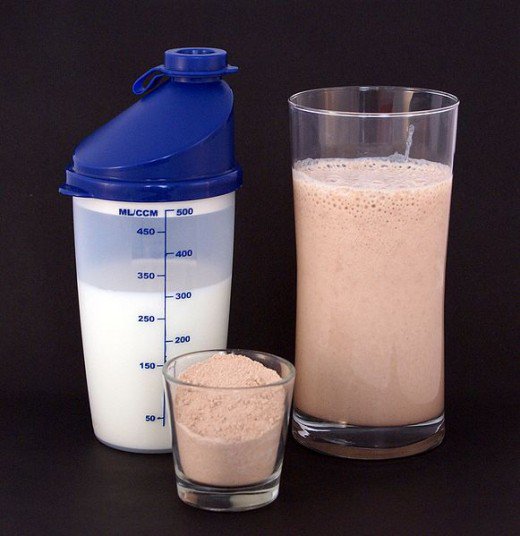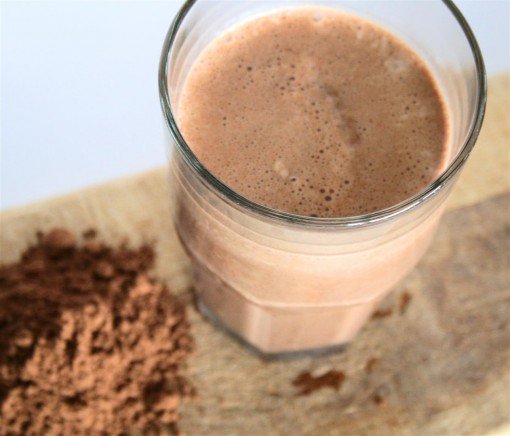
Is that a shot glass of whey protein?!
Welcome to the most comprehensive article on when to take whey protein. I will answer these questions:
- What is whey protein?
- Should I use it before workouts?
- Should I use it during a workout?
- How should I take whey protein after workouts?
- Is it a good idea to take whey protein at night, before bed?
- How often should I take whey protein?
What Is Whey Protein?
Here’s a breakdown of what you should know about whey protein, and protein in general:
- Whey protein is a protein that is easier and quicker to absorb than protein found in most foods. While this is convenient, it doesn’t necessarily mean it is better than foods.
- Background: Protein is required to repair the muscle tears formed from from strenuous and intense exercise. When you put stress on your muscles, you cause tears that actually break down your muscles. Technically, yes — this means that by working out, you are causing your muscles to become weaker.
- How can protein in general help? When you consume protein (whether it be whey, soy, etc.) the tears get repaired. Not only do these tears get repaired to their original state, but, rather, the tears are then more adaptive to exercise, thus leading to strength gains.
- Lastly, let’s not forget that the appropriate amounts of carbohydrates and fats are also required to build muscle and strength.
Before a Workout
While taking protein before a training routine may be good for you, taking it immediately before a workout won’t actually have any effect during your workout. That is, if you don’t give it enough time to interact with your body. In other words, don’t expect to drink a protein shake 2 minutes before working out and feel like Superman. From my experience, I would recommend that you try to drink it at least an hour beforehand.
By having protein in your system before working out, you’re allowing the protein to kickstart the repair process. So, when you start to tear down muscles, the protein will already be there to start repairing them. Another way to think of this is to treat it like an early post-workout meal.
During a Workout
This is an interesting topic, because there are several factors that might lead you to stay away from consuming protein during the workout. One of them being that:
- Whenever you consume anything, your stomach requires extra blood to be pumped to it to digest and metabolize the food. This might be a problem (although, not a big one) when trying to work out. If the blood is being focused on your stomach partially, then it won’t be used for other purposes such as assisting in exercising.
This probably concerns weight lifters far more than than it would cardio folk. In cardio, you may need the extra boost of energy to keep going. But, for lifting, when the work is shorter and more intense, you may not be maximizing on the benefits of your training routine if you have blood pumping to other places.

Makes me want to work out.
After a Workout
As mentioned, taking whey protein after your workout is a good thing — especially for muscle repair. Here are some considerations for your post-workout whey consumption:
- After a workout, your body is starved for energy, or at least is looking for where it can get some to refuel. Typically, when your body is searching for sources of energy either from exercise or prolonged stages of under-consumption, it absorbs nutrients much easier.
- Don’t go overboard and load up twice your body weight of protein. Taking about 40 to 60 grams will be sufficient.
- The time after working out is crucial. In order to capitalize on the protein consumption post-workout, you have roughly 40 minutes to chow down.
- After your post-workout protein, it’s best to eat at least every 2 hours, for 6 hours afterwards. Just because you had your post-workout meal does not mean that your body is done searching for energy to recover.
Before Bed
Have you ever been told not to eat right before bed? Generally speaking, and for most things, it usually isn’t a good idea. Protein, however, is okay.
- Consuming carbohydrates before bed isn’t recommended, but protein is fine. Carbohydrates are strictly for energy purposes, but since you should have consumed enough of them during the day you should not need to sleep on them. You’ll just gain bad weight.
- Instead of anything carb-y, have the protein shake an hour before bed. Protein shakes in this instance are particularly useful because they are low in carbohydrates.
- When you sleep, your muscles are still recovering and so it is a good idea to maintain protein levels throughout the time your body goes into a slight starvation mode.
- Usually, bodybuilders and experienced muscle gainers go for casein protein for pre-bedtime use because it digests slower and longer than whey protein. Since you’ll likely (or ideally) be sleeping 7-8 hours, this is good.
What About When I Wake Up?
Remember what I said before about the “window of opportunity?”
- The “window of opportunity” exists after exercise or when you haven’t consumed anything for a long period of time. Since I’m assuming you don’t sleep-walk to the fridge and grab bites to eat throughout the night, your body is likely eager to eat something when you wake up. This is usually why people say “breakfast is the most important meal of the day” because it’s the time when your body is most ready to digest and absorb.
- Aim for natural foods if you’re like me and you don’t want to chug a protein shake in the morning . . . although I have before. Instead, go for natural foods with high-protein content in them, such as: milk, nuts, lean meats, eggs, yogurt, and dairy in general (okay, don’t have ice cream though).
- Deciding when to have a protein shake and when not to is usually dependent on your budget. I usually choose to have 3 scoops total a day. One and a half scoops after workouts and one and a half before bed. Just monitor how you feel with these amounts based on your training routines and schedule.
- Other times throughout the day, try and have natural foods with protein in them. An easy way to go about this is to just start Googling a protein foods for some good options.

A balanced diet is always important . . . maybe not this much fruit, though.
Tips to Build Muscles and Reduce Appetite With Protein
As you can see, there are many times throughout the day that are great for protein consumption. So what does this mean overall?
- It means that the most effective and efficient way for you to gain muscle and stave off hunger is to eat a fairly consistent amount of protein throughout the day.
- What about when people say you’re supposed to eat twice your body weight in protein? Well, that may be true for extreme bodybuilders. But, normally, one gram per pound of your body weight will be more than sufficient.
- The best way to consume your protein is to do it using natural and protein shakes and to do it throughout the day in small to moderately sized meals.
- Go for yogurt, too. I’ll give a quick, personal testimony here: Greek yogurt is by far the greatest source of natural protein I know of. Have you ever checked out the nutrition label on these things? It has crazy amounts of protein, as well as pretty minimal amounts of carbohydrates. Just make sure to get the flavored kind!
I hope you`ve learned something to help improve your lifestyle and fitness. My goal through this article is`nt to try and promote whey protein, but to show how and why it can be beneficial.
Thanks for reading and please comment if you have questions!
Source: https://caloriebee.com/vitamins-supplements/When-Should-I-take-Whey-Protein

